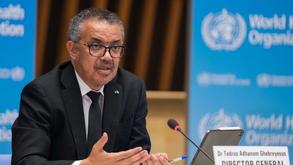 This handout picture taken and released on Feb 12, 2021 by World Health Organization (WHO) shows WHO Director-General Tedros Adhanom Ghebreyesus delivering remarks during a press conference in Geneva. (CHRISTOPHER BLACK/WHO/AFP)
This handout picture taken and released on Feb 12, 2021 by World Health Organization (WHO) shows WHO Director-General Tedros Adhanom Ghebreyesus delivering remarks during a press conference in Geneva. (CHRISTOPHER BLACK/WHO/AFP)
A scientist who took part in the international team studying the origins of COVID-19 has expressed surprise and dissatisfaction at remarks made by WHO Director-General Tedros Adhanom over the hypothesis that the virus leaked from a laboratory in China.
If the next phase of global source tracing for the virus comes to a deadlock, the WHO must assume its due responsibility, said the scientist, who requested anonymity.
The response from the scientist came after Tedros said in a briefing on March 30 that although the team has concluded a laboratory leak is the least likely hypothesis, "this requires further investigation, potentially with additional missions involving specialist experts".
He added he is ready to deploy an additional mission, and "all hypotheses remain on the table" as far as WHO is concerned.
The WHO director-general has disregarded the hard-won research outcomes and consensuses among the international science community in his remarks, the scientist said.
The WHO director-general has disregarded the hard-won research outcomes and consensuses among the international science community in his remarks, said a scientist who took part in the international team studying the origins of COVID-19
ALSO READ: WHO expert: Report on virus origins work of 'collaboration'
"It should not be a position held by the WHO," he said, adding pressure from the United States and the WHO hierarchy was palpable during the communication process with international colleagues.
He added there are some forces harboring ulterior motives using Tedros' remarks to question the authority and scientific nature of the report from the international team. "Experts from the joint team are all very worried and dissatisfied."
An international team of scientists visited Wuhan between Jan 14 and Feb 10 to conduct a COVID-19 origin-tracing study, before releasing a 120-page report on March 30 saying the virus most probably jumped from an animal, potentially a bat or pangolin, to an unknown intermediate animal host and then to humans.
READ MORE: WHO: Animal-to-human virus transmission most likely
The scientist said he did not understand why the WHO chief would make such a statement in spite of the research and consensus among experts.
He explained the hypothesis that the virus emerged from a lab leak was without any scientific basis in the first place, and this was a virtually a consensus among the international scientific community.
However, in the spirit of upholding respect to science and with an attitude of staying highly responsible to the source-tracing work, the joint expert team conducted careful research over all relevant hypotheses, the scientist said.
There could only be two hypotheses over the laboratory theory, one being the virus was artificially synthesized and the other being it was leaked. The hypotheses the virus was artificially synthesized has already been proven to be impossible under current technological conditions, while the hypotheses about a lab leak can only exist if Chinese labs have the virus in storage.
"If the virus cannot be synthesized within a lab, then how can it be leaked?" he said.
He noted the international expert team visited the Wuhan Institute of Virology with the Chinese Academy of Sciences and centers for disease control and prevention in Hubei and Wuhan to learn about the protocols of the lab management and operations and to hold discussions with relevant experts.
The team even conducted antibody tests on the lab workers, and all samples were negative, he said, adding this is more than adequate evidence to prove such speculations are groundless.
READ MORE: WHO expert slams Western media for distorting facts
He also refuted Tedros' remarks that members of the international team expressed the difficulties they encountered in accessing raw data, saying Chinese and WHO experts have been conducting joint research and analysis on data in Wuhan.
"There is no difference for Chinese and foreign experts in access to data. The international expert team has expressed their full understanding, and the two sides have conducted frank exchanges. There were no difficulties over the issue as the director-general has described."


